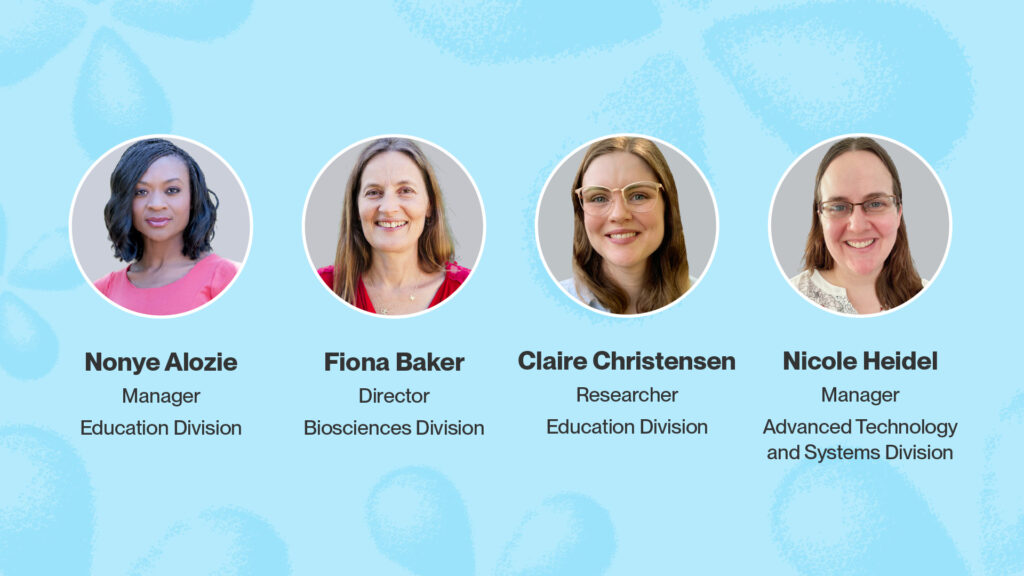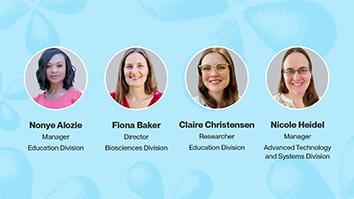
We foster environments where women can innovate, lead, and contribute.
March is Women’s History Month, an opportunity to acknowledge the contributions made by women who are making a difference. In recognition, we’re honoring the women of SRI, whose cutting-edge work and dedication continue to power global innovation in science, technology, education, and business. Here we offer a glimpse of just a few of those women, each of whom describes her role at SRI, her thoughts on working in STEM and beyond, and her advice to women who are considering their life’s work.
Nonye Alozie: I am a principal researcher, manager, and Deputy Director of STEM and CS in the Center for Education Research and Innovation of the Education Division. Currently, I am interested in productive, transformative, and innovative ways to use AI for learning. I’d like to see more science professionals work with students in learning environments to build bridges between education research, practice, and community needs. Because of SRI’s dynamic environment, I’ve had the privilege of engaging with science assessment specialists, machine learning experts, science educators, anthropologists, and others.
To be completely transparent, the challenges I’ve faced throughout my career are undeniable. People often perceive me first as an African American woman and attach the stereotypes, without considering my multiple science degrees, PhD, and post-doctoral fellowship, or acknowledging my academic achievements. I find myself having to validate my qualifications, sometimes even with the same people.
Despite these roadblocks, my interests, passions, goals, and ambitions remain intrinsic to who I am. My commitment stems from a genuine love for learning and personal growth. For young women venturing into science, my guidance is to get to know yourself — recognize your strengths, passions, and what genuinely sparks your interest. Take a close look within to find areas that bring you joy and fuel your curiosity. See science as a captivating journey into the wonders of the natural world — those questions are what makes science great!
Fiona Baker: As the senior program director of the Human Sleep Research Laboratory, I investigate the role of how sleep affects our health. I’m particularly interested in sleep issues in women, the menstrual cycle, the approach to menopause, and how these affect health and daily lives. We’re learning more about how sleep affects the brain and body, and finding solutions to help people have a better night’s sleep and a better quality of life.
I love working with a great team to advance science and the feeling of discovery we experience when we delve into a problem and uncover something important that we didn’t expect. I’ve been lucky to be well-supported throughout my career, and to be in a field that supports diversity, but I’d tell women that it’s sometimes hard to speak up and make your voice heard. Be confident in your knowledge and expertise and know that you’ll add value to the conversation.
A career in STEM is challenging but very rewarding, and it’s so important to make sure a diverse group of people are involved in addressing the scientific challenges we face in all domains, to ensure that we get the right answers and solutions that apply to many of us.
Claire Christensen: I’m a children’s researcher in SRI’s Education Division, where I conduct evaluations to understand what young children can learn from digital media. I also develop innovative solutions to help make children’s screen time safer and more educational. I love this work because I get to make a difference in kids’ lives. Young children spend a lot of time watching videos and using apps. My research helps ensure that those products also support their development. As a bonus, I get to watch a lot of shows and videos for kids, which I love! I’m very fortunate to be in a STEM field – education – in which women are overrepresented;
SRI has been a really positive and supportive work environment for me. I’d tell young women interested in a STEM career to not forget that social science – like psychology and education – counts as STEM too! This field can be a wonderful way to pursue interests in statistics or research studies while also making an impact on people’s development and well-being.
Nicole Heidel: I work in SRI’s Applied Physics Lab within our Advanced Technology and Systems Division, where I lead a team that focuses on photonics, which is the manipulation of light. Photonics is broadly applicable to the communication, quantum, and signal processing domains, and our work touches on all three. From a technical perspective, I love the breadth of work that we do; we’re given lots of latitude to tackle interesting problems, and I enjoy learning about new fields and bringing photonics as a possible solution. I also love the people I work with.
When it comes to being a woman in STEM, people have often assumed that I’m not in a technical role. In response, I subtly — or sometimes not so subtly — reference my background or technical training. If my degrees show up in my email signature, it was meant to remind the sender that I’m a technical person. I advise women to not be afraid to take classes or jobs that challenge them. Acquiring a wide range of skills will be beneficial, especially for a research career.
These and many other women serve as inspiring role models, paving the way for future generations of women in their fields. Their stories remind us of the ongoing need for equality, representation, and support for women and all genders. As we continue to celebrate Women’s History Month, SRI will continue to create environments where people can innovate, lead, and contribute to a more equitable world.



